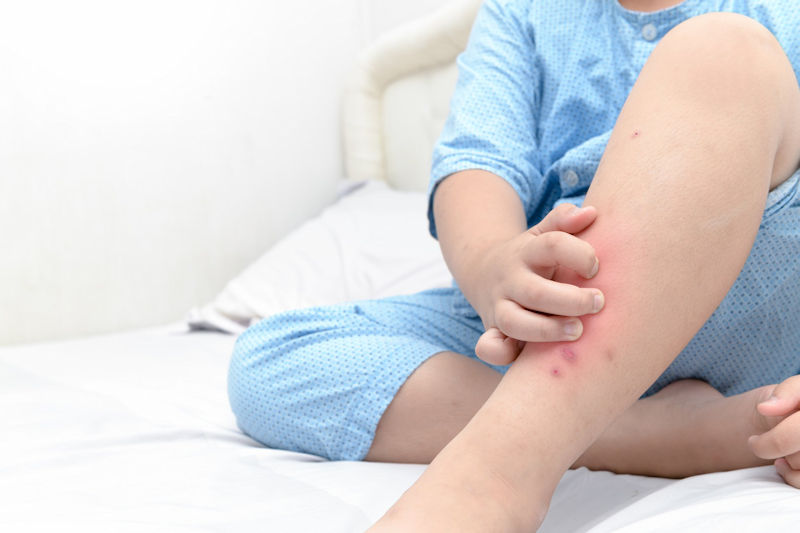Flea Bites: Symptoms, Remedies, and Prevention Guide
Fleas are a significant issue affecting both humans and pets. These tiny pests can be found outdoors and indoors, causing irritation and discomfort. But what exactly do flea bites look like, and how can you avoid or treat them? Below, discover the symptoms of flea bites, remedies to manage them, and prevention tips to keep your home flea-free.
But what do flea bites look like, and how are they contracted? Before you start taking action against fleas, you need to know what their bites look like. Read on to learn about flea bites symptoms, treatments, and prevention tips.
Symptoms of Flea Bites
Proper identification starts with understanding the symptoms. Here’s what to look out for:
- Intense Itching
Flea bites often trigger allergic reactions, causing persistent itching. Scratching the bites can escalate the risk of infection.
- Small Red Bumps
Flea bites appear as small, raised red bumps, usually occurring in clusters or straight lines. They often have a red halo surrounding the affected area.
- Common Bite Locations
Fleas favor thinner skin areas like:
- Ankles
- Feet
- Wrists
- Waistline
In severe infestations, bites may appear anywhere on the body. Some individuals react instantly, while others notice symptoms hours or even days later.
Treating Flea Bites
If you suspect flea bites, take the following steps to ease discomfort and prevent complications:
- Clean the Area: Wash bites with soap and water to eliminate bacteria and dirt.
- Apply a Cold Compress: Use an ice pack or a cloth-wrapped cold compress to reduce swelling and itching.
- Use Anti-Itch Creams: Over-the-counter options like hydrocortisone or calamine lotion can alleviate itching and inflammation.
- Take Oral Antihistamines: For severe symptoms, antihistamines can help reduce itching and improve sleep quality.
- Avoid Scratching: Scratching increases infection risks. Keep your nails trimmed and find distractions to avoid aggravating the bites.
When to See a Doctor:
If you notice worsening redness, swelling, or pus, consult a healthcare provider. They may prescribe stronger treatments or antibiotics.
How to Prevent Flea Infestations
The best way to avoid flea bites is by preventing these pests from entering your home. Here’s how:
- Clean Regularly:
- Vacuum carpets and furniture frequently to remove fleas and eggs.
- Wash bedding, pet blankets, and rugs in hot water.
- Protect Pets:
- Use flea prevention products such as collars or topical treatments.
- Regularly bathe and groom your pets, checking for fleas.
- Maintain Your Yard:
- Trim grass and shrubs.
- Avoid leaving pet bedding outside where fleas thrive.
- Use Flea Repellents:
Apply insect repellents when outdoors and wear protective clothing like long sleeves to minimize skin exposure.
FAQs About Flea Bites
Q: What do flea bites look like?
A: Flea bites are small red bumps, often in clusters or lines, with a red halo around them.
Q: How can I stop flea bites from itching?
A: Use anti-itch creams, cold compresses, or oral antihistamines to reduce swelling and discomfort.
Q: Can flea bites lead to serious health problems?
A: Rarely, flea bites can cause allergic reactions or infections. Prompt treatment helps prevent complications.
Q: How can I tell if my pet has fleas?
A: Look for excessive scratching, irritated skin, or flea dirt (tiny black specks) on their coat.
References
1. (Forbes – “How Long Do Flea Bites Last?”): https://www.forbes.com/home-improvement/pest-control/how-long-flea-bites-last/
2. (Planet Friendly Pest Control – “The Health Risks of a Crawl Space: What Homeowners Need to Know”): https://planetfriendlypestcontrol.com/the-health-risks-of-a-crawl-space-what-homeowners-need-to-know/
3. (Forbes – “What Bit Me? How To Identify and Treat Bug Bites”): https://www.forbes.com/health/wellness/identify-bug-bites/#:~:text=Flea%20Bites&text=After%20a%20bite%2C%20small%20red,Missouri’s%20Division%20of%20Plant%20Sciences.
NEED HELP?
If you live in Southern Maryland, or Northern Virginia
FIND YOUR SOLUTION HERE
People, Pet & Pollinator Safe! Pest control for people who care.
